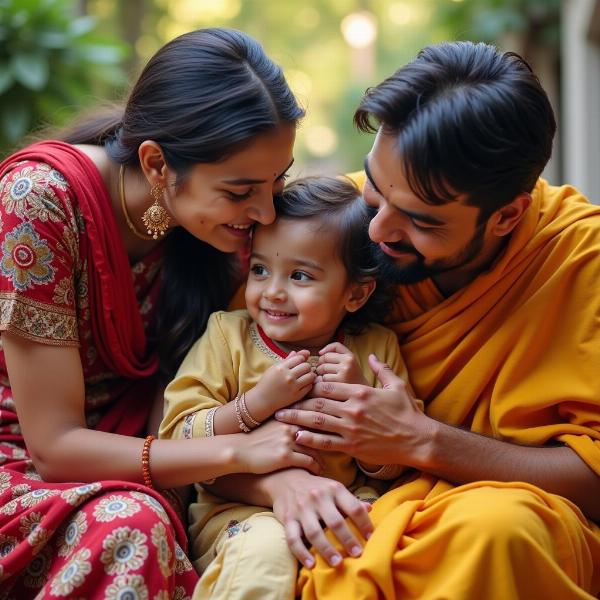“My little prince” is a term of endearment, often used to express affection for a young boy. While a direct, literal translation in Hindi might not capture the nuance of the phrase, understanding its meaning and cultural context can help us find suitable equivalents. This article will explore various ways to express the sentiment of “my little prince” in Hindi, considering cultural appropriateness and the depth of emotion conveyed.
Expressing “My Little Prince” in Hindi
Hindi offers a rich vocabulary to express affection. While there isn’t a single perfect equivalent for “my little prince,” several options capture similar feelings. Choosing the right phrase depends on the relationship with the child and the specific context.
- मेरा छोटा राजकुमार (Mera chhota rajkumar): This is the most literal translation, meaning “my little prince.” While grammatically correct, it can sound slightly formal or even theatrical in everyday conversation.
- मेरा राजा बेटा (Mera raja beta): This translates to “my king son,” and is a more common and affectionate way to address a son. It implies adoration and a sense of pride.
- मेरा लाडला (Mera laadla): This term is filled with affection and often used for a beloved son, implying he is pampered and cherished.
- मेरा प्यारा बेटा (Mera pyara beta): Simply meaning “my dear son,” this is a versatile and widely used expression of love.
- मेरा बच्चा (Mera bachcha): Meaning “my child,” this is a more general term of endearment, suitable for both sons and daughters.
Choosing the Right Expression
The best way to say “my little prince” in Hindi depends on the nuance you want to convey. For a more formal context, “mera chhota rajkumar” might be appropriate. However, in everyday conversations, more natural and affectionate terms like “mera raja beta” or “mera laadla” are preferred.
Considering Regional Variations
Hindi is spoken across a vast geographical area, and regional dialects often have their unique expressions of endearment. While the terms listed above are generally understood, exploring region-specific terms can add a touch of authenticity and intimacy.
Why “My Little Prince” Resonates
The phrase “my little prince” carries a sense of fairytale charm and innocence. It signifies a special bond and a feeling of protectiveness towards the child. While Hindi might not have a direct equivalent with the same fairytale connotation, the available options effectively communicate love, affection, and a sense of specialness.
Cultural Context
In Indian culture, expressing affection towards children is common and encouraged. Terms of endearment are frequently used within families and close circles. The choice of words reflects the depth of the relationship and the cultural context.
 Indian Family Expressing Affection
Indian Family Expressing Affection
Conclusion
While a precise, literal translation of “my little prince” might not exist in Hindi, several expressions beautifully capture the sentiment behind the phrase. Understanding the nuances of these expressions and the cultural context allows you to choose the most appropriate and heartfelt way to address your “little prince” in Hindi. Remember, the most important aspect is the genuine affection conveyed through the chosen words.
FAQ
- What is the most common way to say “my little prince” in Hindi? While “mera chhota rajkumar” is the literal translation, “mera raja beta” or “mera laadla” are more commonly used and sound more natural in conversation.
- Is it culturally appropriate to use terms of endearment for children in India? Yes, expressing affection towards children is a common and cherished practice in Indian culture.
- Are there regional variations in how people express affection in Hindi? Yes, different regions within India may have unique terms of endearment for children.
- Does “mera chhota rajkumar” sound natural in everyday conversation? While grammatically correct, it can sound a bit formal or theatrical in casual settings.
- What if I want to express affection for a young girl? You can use terms like “meri pyari beti” (my dear daughter), “meri gudiya” (my doll), or “meri pari” (my fairy).
Related Articles on Meaning-Hindi.in
Meaning-Hindi.in offers expert translation services specializing in Hindi and various other languages. We cover a wide range of fields, from business and legal documents to technical manuals and educational materials. Whether you need website localization or certified translation, our team provides accurate, culturally sensitive, and high-quality translations. Contact us today for all your translation needs at [email protected] or call us at +91 11-4502-7584. Meaning-Hindi.in is your trusted partner for bridging language barriers.